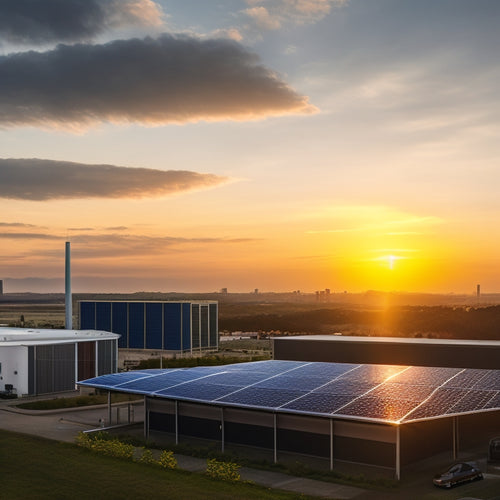
Off Grid Solar Power Systems With Battery Storage
Share
You're considering off-grid solar power systems with battery storage to achieve energy independence and self-sufficiency. This setup enables you to generate clean energy from sunlight, eliminating reliance on traditional utility companies and fluctuating energy prices. With battery storage, you can overcome the challenges of inconsistent energy supply and promote energy self-sufficiency. By capturing solar energy, you'll reduce your carbon footprint and shift to eco-friendly energy alternatives. You'll need to select the right deep cycle battery type, consider amp-hour capacity ratings, and guarantee longer power outage backup capabilities. Now, explore how to optimize your system's performance and tailor it to your specific energy needs.
The Essentials
- Off-grid solar power systems with battery storage enable energy independence, reducing reliance on traditional utility companies and fluctuating energy prices.
- Battery storage allows for overcoming challenges of inconsistent energy supply, promoting energy self-sufficiency and control over energy needs.
- Lithium-ion batteries offer higher energy density and lower maintenance, making them a suitable option for long-term investment in off-grid solar systems.
- Accurate sizing of battery capacity is crucial, considering daily energy consumption, desired days of autonomy, and system voltage.
- Regular maintenance and monitoring of battery state of charge and operating conditions are essential for optimizing performance and lifespan.
Energy Independence From Grid
You're looking to break free from the grid and gain energy independence.
With an off-grid solar power system, you can capture renewable energy from the sun to power your home or business.
By leveraging this clean energy source, you'll reduce your reliance on traditional utility companies and enjoy a more sustainable, self-sufficient lifestyle.
Break Free From Grid
One of the most significant benefits of off-grid solar power systems is the ability to break free from the grid and achieve energy independence. You'll no longer be tied to the grid's reliability or pricing, giving you the freedom to generate your own clean energy.
With a solar panel installation, you'll be utilizing the power of the sun to fuel your home or business, reducing your reliance on traditional energy sources. By opting for off-grid solar power systems with battery storage, you'll also be able to overcome the challenges of inconsistent energy supply and equipment damage often associated with traditional solar panel systems.
Breaking free from the grid also means you'll experience significant energy cost savings. You won't have to worry about fluctuating energy prices or being locked into a contract with your utility company.
Instead, you'll be generating your own energy and storing it in a battery storage system, giving you complete control over your energy usage. This means you can power your home or business at a fraction of the cost, while also reducing your carbon footprint.
Renewable Energy Source
Two significant advantages of off-grid solar power systems are their ability to provide a renewable energy source and guarantee energy independence from the grid.
You'll no longer be reliant on fossil fuels, reducing your environmental impact and contributing to a cleaner, healthier planet. By capturing solar energy, you'll tap into a sustainable solution that's both abundant and free.
When considering an 'Off Grid Solar Power System', many shoppers are enthusiastic to break free from the constraints of traditional grid-based energy and capture the power of the sun for their homes or businesses renewable energy solutions. This change is driven by the desire for energy self-sufficiency and reducing reliance on the grid.
Off-grid solar power systems employ renewable technologies to convert sunlight into electrical energy, ensuring a consistent power generation.
This clean energy is then stored in energy storage systems, providing you with a reliable source of power even during periods of low solar efficiency.
By moving to off-grid living, you'll not only reduce your carbon footprint but also benefit from energy conservation. You'll be in control of your energy needs, free from the constraints of the grid.
With an off-grid solar power system, you'll enjoy the freedom to live life on your own terms, unshackled from the grid and its limitations.
Reduced Carbon Footprint Guaranteed
By installing an off-grid solar power system, you're switching to eco-friendly energy alternatives that greatly reduce your reliance on fossil fuels.
With complete solar power systems, including solar panels, energy storage batteries, and inverters, you can power your home remotely with renewable energy solutions renewable energy packages.
As a renewable energy source, solar power generates electricity without emitting harmful greenhouse gases, ensuring a cleaner environment.
With an off-grid solar power system, you're guaranteeing a reduced carbon footprint and contributing to a sustainable future.
Eco-Friendly Energy Alternatives
Embracing eco-friendly energy alternatives is essential in today's environmentally conscious world, where reducing carbon footprint has become a top priority.
You're likely considering off-grid solar power systems with battery storage as a means to achieve sustainable living and minimize your environmental impact. Fortunately, there are various green technologies available to support your shift.
Solar incentives, for instance, can help offset the initial investment costs of DIY installations or community solar projects. By utilizing renewable energy, you'll not only reduce your reliance on fossil fuels but also enjoy significant cost savings in the long run.
When it comes to energy efficiency, off-grid solar power systems with battery storage offer a reliable and efficient solution.
These systems enable you to store excess energy generated during the day for use during the night or on cloudy days, ensuring a consistent power supply.
Renewable Energy Source
You've chosen to employ the power of solar energy, a renewable source that guarantees a reduced carbon footprint. This choice aligns with your desire for sustainable living, as solar energy is a clean and abundant resource. By capturing the sun's energy, you're reducing your reliance on fossil fuels and minimizing your impact on the environment.
As a renewable energy source, solar energy is sustainable and non-depletable. The sun's energy is available everywhere, making it an ideal option for off-grid power systems. With solar panels, you can generate electricity independently, without being connected to the grid. This means you'll have consistent power, even during outages or in remote areas.
Solar energy is also a cost-effective option in the long run. While the initial investment in solar panels and battery storage may seem high, you'll save money on energy bills and maintenance over time.
Plus, with the current incentives and tax credits, the cost of going solar has never been more affordable. By choosing solar energy, you're taking a significant step towards a more sustainable future.
Deep Cycle Battery Types
You'll need to choose a deep cycle battery type that suits your off-grid solar power system's requirements.
Considering residential solar power and solar energy storage systems can help you determine the best battery for your needs.
When selecting a battery, you'll consider factors like battery chemistry options, such as lead-acid, lithium-ion, or nickel-cadmium, and battery lifespan factors, including depth of discharge, charge cycles, and maintenance needs.
Battery Chemistry Options
Three primary deep cycle battery types dominate the off-grid solar power systems market, each with its unique chemistry and characteristics.
As you consider your battery storage options, understanding the pros and cons of each type is essential.
Lead Acid batteries have been around for a long time, but they come with some significant disadvantages, including lower energy density, heavier weights, and higher maintenance requirements.
On the other hand, Lithium batteries offer several advantages, such as higher energy density, longer lifetimes, and lower maintenance needs. However, they come at a higher upfront cost.
When it comes to charging methods, both types can be charged using similar methods, but Lithium batteries are more sensitive to temperature effects.
In terms of safety concerns, Lithium batteries are generally considered safer due to their lower risk of overheating and explosion.
Recycling options also vary, with Lead Acid batteries being more widely recyclable.
When comparing costs, Lithium batteries may be more expensive upfront, but their longer lifespan and lower maintenance requirements can make them a more cost-effective option in the long run.
Ultimately, the choice between these battery types depends on your specific needs and priorities.
Battery Lifespan Factors
Taking into account the substantial investment in deep cycle batteries for your off-grid solar power system, it's vital to understand the factors that impact their lifespan, thereby maximizing their overall value.
You'll want to know how to get the most out of your batteries, and that means paying attention to the factors that affect their lifespan.
Temperature, for instance, plays an important role in determining how long your deep cycle batteries will last. High temperatures can greatly reduce the lifespan of your batteries, while cooler temperatures can help extend it.
You'll also need to take into account the depth of discharge (DOD), which refers to how deeply you drain your batteries. A higher DOD can reduce the lifespan of your batteries, so it's important to strike a balance between energy storage and battery maintenance.
Additionally, the environmental impact of your batteries is another significant factor to take into account. Look for batteries with a low environmental footprint, and think about recycling options at the end of their lifespan.
Consider Amp-Hour Capacity Ratings
You'll need to take into account the amp-hour capacity ratings of your deep cycle batteries, as they come in various options.
When selecting a battery, it's crucial to evaluate factors such as renewable energy batteries and the type of battery, like lithium-ion, to guarantee reliable energy storage.
For instance, you can choose between 200Ah, 400Ah, or 800Ah ratings, depending on your specific energy needs.
To determine your total capacity needs, you'll need to calculate your daily energy consumption and factor in days of autonomy.
Deep Cycle Options
Deep cycle batteries are an essential component of off-grid solar power systems, as they store excess energy generated by the solar panels during the day for use during the night or on cloudy days. When choosing a deep cycle battery, you'll want to take into account the amp-hour capacity ratings, as this determines how much energy the battery can store.
| Battery Type | Advantages | Considerations |
|---|---|---|
| Lithium | High energy density, long lifespan, and low maintenance | Higher upfront cost, requires specialized charging techniques |
| Lead Acid | Lower upfront cost, well-established technology | Heavier, lower energy density, and requires regular maintenance |
| AGM | Sealed maintenance-free design, high reliability | Lower energy density, higher cost than lead acid |
You'll also want to take into account the installation tips, such as guaranteeing proper ventilation and securing the batteries in a well-protected area. Additionally, you should factor in the cost analysis, including the initial investment and long-term maintenance costs. By choosing the right deep cycle battery for your off-grid solar power system, you can guarantee a reliable and efficient source of energy.
Total Capacity Needs
Six key factors determine your total capacity needs: your energy usage, the number of days you want the system to run without sun, the system's voltage, the depth of discharge, the round-trip efficiency, and the temperature.
To accurately size your system, you'll need to take into account each of these factors. Start by conducting a load analysis to determine your energy usage in watt-hours per day. Then, decide how many days you want your system to run without sun, known as days of autonomy.
Next, think about the system's voltage, which typically ranges from 12 to 48 volts. The depth of discharge, typically 50% for deep cycle batteries, will also impact your total capacity needs.
Additionally, the round-trip efficiency, which accounts for energy lost during charging and discharging, should be factored in.
Finally, temperature will affect your battery's performance, so it's crucial to take into account the operating temperature of your system.
Longer Power Outage Backup
You'll need extended backup capabilities if you live in an area prone to prolonged power outages or extreme weather conditions.
In such cases, a standard off-grid solar power system may not be enough to keep your essential appliances running.
You'll want to evaluate backup options that can provide power for several days or even weeks, ensuring your comfort and safety during extended outages.
Extended Backup Capabilities
A significant aspect of off-grid solar power systems is their ability to provide extended backup capabilities during longer power outages. You want to verify your system can handle prolonged periods of grid downtime, and that's where battery maintenance comes in.
Regular checks and maintenance of your battery bank are vital to extending backup capabilities. This includes monitoring state of charge, voltage, and temperature to prevent degradation and optimize performance.
Solar efficiency also plays a notable role in extended backup capabilities. By maximizing your solar array's energy production, you can recharge your batteries faster and more efficiently. This means you'll have a larger energy reserve to draw from during extended power outages.
With a well-designed and well-maintained system, you can enjoy uninterrupted power supply even when the grid is down for an extended period.
When sizing your off-grid solar power system, take into account your energy needs during extended power outages. You may want to think about oversizing your system to guarantee you have enough power to cover vital loads during prolonged periods of grid downtime.
Frequently Asked Questions
Can I Use Off-Grid Solar Panels With Existing Grid-Tied Systems?
You can upgrade your existing grid-tied system to a hybrid system, combining the benefits of both worlds, and take a step towards energy independence, but you'll need to guarantee compatibility and adhere to safety standards.
How Long Does It Take to Charge the Batteries From Empty?
As you bask in the radiant sun, your battery's empty tank is refueled like a parched plant quenched by morning dew. With solar efficiency in mind, you'll recharge your batteries in 4-8 hours, depending on system size and available sunlight.
Are Off-Grid Solar Systems Compatible With Generators?
You'll be relieved to know that yes, you can integrate a generator with your off-grid system, creating a hybrid setup that guarantees energy reliability; this generator integration allows for seamless backup power when the sun doesn't shine.
Can I Add More Batteries to My Existing System Later?
You're wondering if you can add more batteries later - the answer is yes, but it depends on your system's compatibility and available capacity.
Will an Off-Grid Solar System Work With 3-Phase Power?
You're wondering if your system can handle 3-phase power; the answer lies in solar inverter options, where you'll find some models offering three-phase compatibility, ensuring a seamless integration and efficient energy distribution, giving you the freedom to power your off-grid lifestyle.
Final Thoughts
As you consider off-grid solar power systems with battery storage, remember that energy independence from the grid is within reach. You'll not only reduce your carbon footprint but also guarantee a reliable power supply during outages. With the right deep cycle battery type and amp-hour capacity rating, you can enjoy extended backup power. Did you know that a typical American household can save up to $400 annually on energy bills by switching to solar power?
Related Posts
-

Top Portable Refrigerators for Camping Adventures
When you're camping, having a reliable portable refrigerator can make all the difference for keeping your food fresh ...
-

Replacing Old Appliances With Sustainable Alternatives
Replacing old appliances with sustainable alternatives can change your home into an energy-efficient space. Not only ...
-

Advantages of Commercial Solar Battery On-Site Storage
By investing in a commercial solar battery on-site storage system, you can greatly reduce your energy grid dependence...


